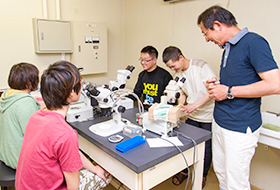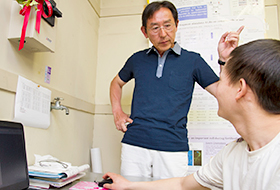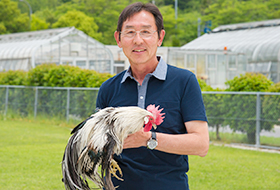 |
| |
 |
| |
|
Striving to develop a method for germ cell preservation, to hand down
previous genetic resources to future generations.
|
| |
 |
|
Professor Teruo Maeda mainly conducts research into “artificial
manipulation of germ cells.” This research involves manipulating sperm, eggs
and fertilized embryos. He explains that “In terms of human beings, you can
imagine this research as something like infertility treatment.”
To be more specific, Prof. Maeda conducts studies on the preservation of the
sperm of domestic animals and poultry, the use and preservation of
primordial germ cells, which are precursors of sperm, and the preservation
of embryos. Sperm carries genetic information only on the male side, whereas
eggs contain genetic information on the female side alone. However, his
research theme is to develop a method of preserving fertilized embryos while
maintaining genetic information inherited from both the male and female
sides.
“For instance, a bird egg is very large, even it is a single cell, in which
the process of development is completed so that an embryo grows into a
chick. My research aims to preserve such an embryo,” says the professor.
Since mammalian eggs are small, these eggs can be successfully refrigerated.
However, a technique to preserve a large embryo, for example, a chicken egg,
has not been established yet. |
|
| |
Distinctive among his studies is research using Onagadori,
which literally means “Long-tailed Chicken,” a breed of chicken originating
in Japan.
He explains that “The Japanese Avian Bioresource Project Research Center of
Hiroshima University is home to many native Japanese chickens, which have
been designated for special protection. I am in charge of making sure that
these precious genetic resources will be preserved for future generations. A
research project supported by a grant for scientific research is under way,
in which we have produced embryonic stem cells (ES cells) using the embryo
of Onagadori, and we have succeeded in culturing these cells for about the
next five to ten generations.”
He adds that Hiroshima University has attracted many researchers who deal
with chickens, offering one of the world’s most favorable research
environments for these scientists. |
|
 |
|
| |
|
The real pleasure of my research lies in taking on a challenge to make what
is considered impossible possible.
|
| |
 |
|
In fact, preserving live chicken eggs, which the professor aims
to achieve, is thought to be impossible around the world.
“For edible use, chicken eggs can be kept for a month in a refrigerator.
However, fertilized chicken eggs can only be kept ‘alive’ up to two weeks or
so, even in a refrigerator. Nevertheless, I aim to semi-permanently preserve
fertilized live chicken eggs, enabling the embryos to develop into chicks
that effectively inherit both the male and female (parents’) genetic
information.”
He continues that, “I have an image that is close to organ storage. I want
to somehow discover a method of preserving fertilized live chicken eggs,
based on the image of preserving a tissue or organ, rather than a cell.”
He continues that, “I have an image that is close to organ storage. I want
to somehow discover a method of preserving fertilized live chicken eggs,
based on the image of preserving a tissue or organ, rather than a cell.”
|
|
| |
“Around that time, I became interested in why sperm was damaged
when being frozen,” he recalls. Since then, for nearly three decades, he has
continued to attempt various approaches of germ cell manipulation.
“The ultimate goal is to be able to produce many good animals. I believe
that it is my duty to ensure that precious genetic resources will be
bequeathed to future generations,” he says with a calm smile on this
face.
He also says definitely that “I do not much care about winning an award or
being covered by a famous scientific magazine. Rather, my greatest pleasure
is to study with my students and see them develop themselves.” |
|
 |
|
| |
|
Endeavoring to nurture students, and maintain and improve the environment
for education and research
|
| |
|



|
|
Many international students are studying at Prof. Maeda’s
laboratory. In the past, he accepted students from Egypt, Sudan, Nepal,
Zambia, China and other countries. Now these students are playing important
roles in their home countries.
He states that “Currently I am instructing students from China and
Afghanistan in my laboratory. After returning to their home countries, I
expect that they will find employment as a university faculty member and the
like. I am truly delighted to see graduates from my laboratory actively
working around the globe.” He is looking forward to visiting various parts
of the world to meet his former students again.
Prof. Maeda also serves as the Director of the Setouchi Field Science
Center. He is therefore hoping to promote a major renovation of the aging
facilities, so as to rebuild them into modern agricultural facilities.
“It is also my important duty to develop an environment that will facilitate
the education of students and benefit younger researchers, while pushing
forward with my research” he says with a smile on his face. This attitude of
the professor clearly demonstrates his sincere wish to contribute to future
generations, just as in the case of his research aimed at developing
technology for preserving germ cells.
To conclude this interview, Prof. Maeda gave the following message to young
people who wish to enroll in Hiroshima University in the future.
“I would like to advise you not to decide from the beginning to pursue a
certain research theme and enter a certain laboratory. Instead, I recommend
that first you develop an interest in all sorts of things and make various
attempts, while acquiring a broad range of knowledge. In the process of
learning diverse subjects, you should then select something you find
particularly intriguing and take up that course. There are many fields where
you can exhibit your individuality. I suggest that you take such an attitude
when thinking about your future path.” |
|
| |
| Teruo Maeda |
Professor
Laboratory of Animal Reproduction
April 1, 1981 – June 30, 1990 Research Associate, School of Applied Biological Science,
Hiroshima University
July 1, 1990 – March 31, 2002 Associate Professor, School of Applied Biological
Science, Hiroshima University
April 1, 2002 – October 31, 2005 Associate Professor, Graduate School of Biosphere
Science, Hiroshima University
November 1, 2005 – present Professor, School of Applied Biological Science, Hiroshima
University
April 1, 2012 – present Director, Setouchi Field Science Center, Graduate School of
Biosphere Science, Hiroshima University
Posted on Oct 28, 2015
|
| |









